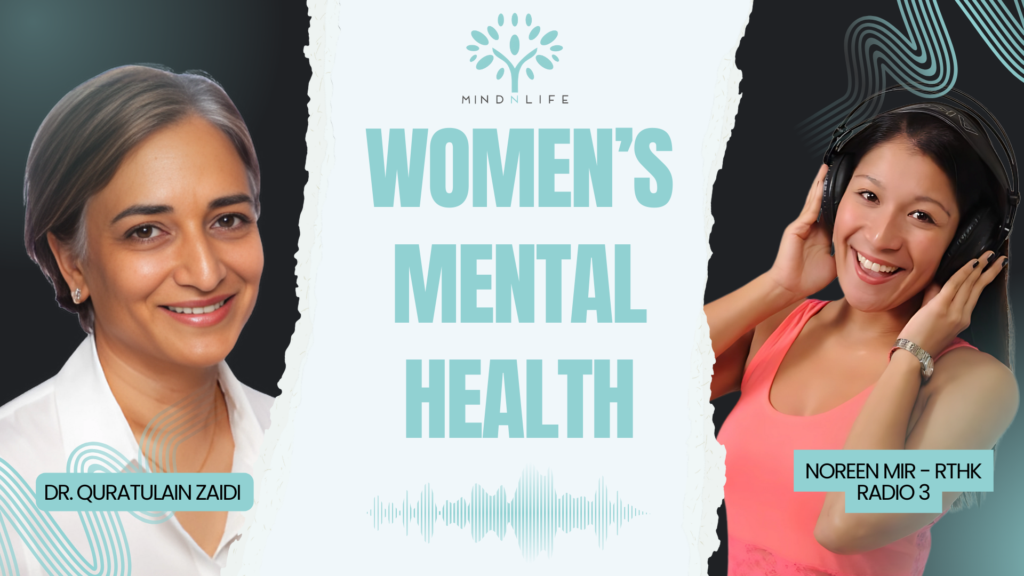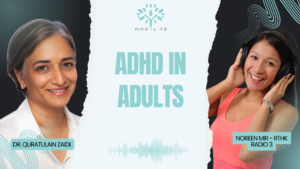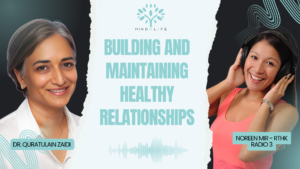In the hustle and bustle of daily life, women often find themselves juggling multiple roles – career professional, caregiver, parent, partner – leaving little room for self-care. This balancing act takes a significant toll on women’s mental health, particularly during midlife, as clinical psychologist Dr. Quratulain Zaidi explained in a recent RTHK Radio 3 interview with host Noreen Mir.
Women face unique mental health challenges during this life stage due to a combination of biological, social, and cultural factors. Midlife is often marked by major transitions such as menopause, career shifts, caregiving responsibilities, and evolving family dynamics.
The Sandwich Generation
The term “sandwich generation” aptly describes many women in their middle years – simultaneously caring for both children and ageing parents. This dual responsibility creates chronic stress and burnout that can be overwhelming.
“What I’m seeing more and more, even in my own practice, is that people in this age group are finding it very challenging,” Dr. Zaidi explained. “Being able to manage the care for your ageing parents, especially if you’re living away from them, while also managing family dynamics with siblings – all without feeling constantly guilty – is a real struggle many women face.”
The emotional exhaustion from managing the needs of multiple dependents can lead to increased risk of depression and anxiety, particularly when women feel overwhelmed or unsupported.
Self-Care Takes a Back Seat
One of the most concerning patterns Dr. Zaidi observes is women’s tendency to prioritise everyone else’s needs above their own.
“Most women tend to put themselves at the bottom of the list,” she noted. “If you have a doctor’s appointment, of course it can wait because it’s not urgent. If you have something you want to do and something else comes up, you will cancel your plans.”
Host Noreen Mir agreed, sharing a personal anecdote about delaying a dental appointment for six months despite experiencing pain, which ultimately resulted in needing a root canal – a procedure that could have been avoided with earlier intervention.
This pattern of neglecting self-care serves as a powerful metaphor for mental health. As Dr. Zaidi pointed out, “If you had gone to see the dentist immediately, it might have been a much less invasive procedure. The same thing applies to mental health. If you let it go for so long, it does become a point where you can’t function.”
The Career Balancing Act
For many women in midlife, this period coincides with reaching the peak of their careers, adding another layer of pressure.
“At this stage, a lot of women are at the top of their careers or heading towards the top,” Dr. Zaidi observed. “The jobs become so much more demanding, and the pressures increase significantly.”
This often leads to feelings of inadequacy across all life domains – not being a good enough parent, caregiver, or professional.
Dr. Zaidi recommends several practical strategies:
- Asking for help and delegating responsibilities where possible
- Setting realistic expectations for oneself—perfection is not necessary
- Negotiating flexible work arrangements if possible
- Taking regular breaks to prevent burnout
- Practising mindfulness to ease mental overwhelm
Building Support Networks
Strong social connections are crucial for women’s mental wellbeing. Dr. Zaidi emphasised the importance of investing in friendships and support networks.
“It’s important for women to have a social support network and constantly check in and invest in that,” she advised. “That support reduces feelings of isolation and loneliness because so many are going through very similar experiences.”
These connections provide both emotional and practical support, offering different perspectives and creating safe spaces to share feelings openly – something that became especially apparent during the social isolation of the COVID-19 pandemic.
Ways to strengthen social support include:
- Maintaining friendships and investing time in relationships
- Joining community groups or women’s organisations
- Seeking professional therapy if needed
- Attending support groups for specific challenges (e.g., caregiving, workplace stress)
Healthy Coping Mechanisms
When it comes to managing stress, Dr. Zaidi recommends finding strategies that work for the individual, whether it’s meditation, journaling, exercise, or something else entirely.
“Whatever works for you is the first thing,” she explained. “Find something that works for you and be consistent with it. Biologically, it helps reduce cortisol levels in your body and closes your stress loop daily.”
Effective coping strategies for women include:
- Mindfulness & meditation: Reduces stress and improves emotional regulation
- Regular exercise: Boosts mood and relieves tension
- Journaling: Helps process emotions and reduce anxiety
- Creative outlets: Engaging in hobbies like painting, music, or writing
- Therapy & counselling: Seeking professional help when overwhelmed
- Setting boundaries: Learning to say no to excessive demands
- Prioritising sleep: Ensuring adequate rest to maintain mental clarity
Overcoming Barriers to Support
Despite growing awareness, stigma remains a significant barrier to seeking mental health support. The underlying belief is often: “If I need to see a psychologist or take medication, there must be something wrong with me.”
Dr. Zaidi challenges this perception: “Just like your physical health, you need to see a doctor or dentist when you’re in pain. It’s about giving yourself permission to ask for help.”
Cultural expectations, particularly in Asian societies, can compound this issue with beliefs that problems should be solved within the family. However, Dr. Zaidi emphasises that seeking professional support isn’t about discussing problems but rather gaining better understanding of oneself and taking charge of one’s mental wellbeing.
Women face several other barriers when seeking mental health support:
- Time constraints due to caregiving and work commitments
- Financial limitations preventing access to therapy or treatment
- Cultural or societal expectations that discourage seeking help
Some ways to overcome these barriers include:
- Normalising mental health discussions within families and communities
- Utilising online therapy or support groups for flexibility
- Advocating for workplace mental health policies that support women
- Seeking financial assistance programmes for mental health care
Long-term Implications
Neglecting mental health can have serious long-term consequences. Chronic anxiety and depression affect not just psychological wellbeing but physical health too, with increased risks of heart disease, high blood pressure, and cognitive decline in later years.
The long-term implications of neglecting mental health include:
- Chronic anxiety and depression that worsen over time
- Increased risk of physical illnesses such as heart disease and high blood pressure
- Cognitive decline and higher likelihood of dementia in later years
- Strained relationships as one becomes less present and increasingly isolated
- Loss of personal identity when consumed by caregiver roles or work
Dr. Zaidi emphasises that early intervention is key: “The severity – if you catch it early, then it doesn’t need to become more serious.”
The Role of Self-Care
Self-care is vital for preventing burnout and maintaining emotional and physical health. Effective self-care practices include:
- Regular exercise: Yoga, walking, or any physical activity
- Healthy nutrition: Eating a balanced diet to support brain function
- Sleep hygiene: Maintaining a consistent sleep routine
- Alone time: Prioritising moments of solitude for relaxation
- Enjoying leisure activities: Reading, gardening, or other fulfilling hobbies
- Seeking professional help: Therapy, coaching, or personal development programmes
For women navigating the complex landscape of midlife mental health challenges, the message is clear: prioritising self-care isn’t selfish—it’s essential for long-term wellbeing and for fulfilling all the other roles women juggle daily.
Final Thoughts
Women’s mental health is deeply connected to the roles they play in society, their families, and the workplace. By prioritising self-care, seeking support, and embracing healthy coping strategies, women can maintain resilience and wellbeing throughout midlife and beyond.
Women who take charge of their mental health not only improve their own quality of life but are better equipped to handle the multiple roles they juggle daily. The message from experts like Dr. Zaidi is clear: it’s not selfish to prioritise your mental wellbeing—it’s necessary.
Watch the interview on the MindNLife Youtube Channel:




